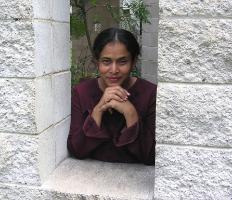Helping computers to 'learn' vital in battle against cancer
Published on 23 September, 2008
Imagine if your doctor could test you for cancer and instantly draw on lessons learned from billions of previous patient records.
They could swiftly put your test results into perspective for early and effective treatment.

Jesmin believes quality cancer data can save lives
That possibility is a little closer each day thanks to the efforts of researchers - including CQUniversity Rockhampton PhD candidate Jesmin Nahar - who are using the ability of computers to ‘learn' and their ability to crunch massive data sets.
Jesmin has a personal, as well as professional, interest in the cancer research.
Also, her husband and CQUniversity colleague Dr A.B.M Shawkat Ali is carrying out related research in computer science, data mining and bioinformatics.
Jesmin is collaborating worldwide with researchers who are feeding genetic data (expressed as microarrays) and image data (from CT Scans, MRI, ultrasounds, mammograms , X-ray etc) into computers.
The idea is to build up computer models for all the different stages of at least 13 different types of cancer and to use so many millions or billions of examples that the computer develops reliable algorithms using the machine learning concept.
These algorithms (or complex mathematical ‘what ifs') can be brought into play the instant a fresh test sample arrives, meaning treatment can begin before there has been too much defected cell division.
"The idea is for early cancer detection, discovery of significant risk factors and possibly even prevention of cancer if we can find out quickly enough what is happening with each patient," Jesmin said.
"Extracting more useful information from structured and unstructured biological data is crucial for the health industry.
"Examples include a doctor who needs to identify a breast cancer patient in the early stage or estimating survival time for patients with prostate cancer.
"Nowadays there's been an explosion in biological data available in the data bases. However, information extraction and true open access to the data are still difficult issues, although they are gradually being addressed.
"The emergence of novel IT technologies allows doctors to fast-track comprehensive analyses ... this may soon exert a dramatic change in the pace of cancer research and impact dramatically on the care of cancer patients."
Jesmin completed her Masters degree in the same field at Melbourne's Deakin University and hopes to spend the rest of her career paving the way for the goal of beating cancer.
"Quality cancer data saves life with IT technology - I believe that," Jesmin said.
"Using reliable sources, I have collected a range of cancer data and used it for extracting information through data mining techniques/algorithms.
"Extracted information is used for model building through mathematical procedures. And on the basis of that model through the learning algorithm, the computer is learning for the further prediction of cancer.
"The computer can tell us very quickly about the status of patient. And then the health practitioner and cancer patient can take the necessary steps which could save the patient's life.
Jesmin notes that cancer is the No1 killer in Australians. Three out of every 10 Australians will be diagnosed with cancer in their lifetime.
Currently, one in 4 deaths in the United States is due to cancer. Fortunately, new treatments and technologies mean survival for people with cancer who once had no hope.
Sustained research is the key to managing cancer, and hopefully, one day stopping it in its tracks.

